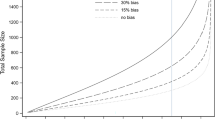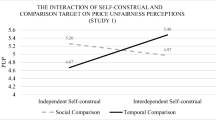Abstract
The aim of the present report is to review research demonstrating the role played by expectations for observed illusory price increases after the euro introduction in Germany. In laboratory experiments when participants are asked to estimate price changes in a restaurant following the euro introduction, the price estimates are found to be biased in the direction of the expectation of rising prices. The research also examines the extent to which a similar judgment bias is evident in other areas and how interventions counteract the bias. A further focus of the research is on the underlying process. In this respect the results show that the bias is based on a selective outcome correction process not previously described. Theoretical implications and practical implications for consumer policy issues are highlighted.




Similar content being viewed by others
Notes
In addition, we created a second, parallel version where the same dishes that had become more expensive in the first version now became cheaper and vice versa. We did this in order to test whether the position of the dish on the menu had an influence on the price trend estimations. The result showed no significant differences between the two parallel versions of the menu.
At the beginning of each session we told the participants (students) in the control group that everyone who participated in the survey would take part in a lottery with two cinema tokens as a prize, whereas the participants in the experimental group were told that the person with the most accurate estimates would receive two cinema tokens.
References
Anderson, C. A., & Kellam, K. L. (1992). Belief perseverance, biased assimilation, and covariation detection: The effects of hypothetical social theories and new data. Personality and Social Psychology Bulletin, 18, 555–565.
Anderson, C. A., & Lindsay, J. J. (1998). The development, perseverance, and chance of naive theories. Social Cognition, 16, 8–30.
Asch, S. E. (1946). Forming impressions of personality. Journal of Abnormal and Social Psychology, 41, 258–290.
Barber, T. (2002). Euro adds currency to price fears in Germany. Financial Times. Retrieved November 7, 2002, from http://search.ft.com/ftArticle?queryText=price+fear+germany+Euro&y=6&aje=true&x=21&id=020530012586&ct=0.
Batson, C. D. (1975). Rational processing or rationalization? The effect of disconfirming information on a stated religious believe. Journal of Personality and Social Psychology, 32, 176–184.
Billman, D., Bornstein, B., & Richards, J. (1992). Effects of expectancy on assessing covariation in data: “Prior belief” versus “meaning”. Organizational Behavior and Human Decision Processes, 53, 74–88.
Chapman, L. J., & Chapman, J. P. (1967). Genesis of popular but erroneous psycho-diagnostic observations. Journal of Abnormal Psychology, 72, 220–226.
Chlumsky, J. (2003). Preisentwicklung im Jahr 2002 [price changes in the year 2002]. Statistisches Bundesamt: Wirtschaft und Statistik, 1, 55–65.
Darley, J. M., & Gross, P. H. (1983). A hypothesis-confirming bias in labeling effects. Journal of Personality and Social Psychology, 44, 20–33.
Ditto, P. H., & Lopez, D. F. (1992). Motivated skepticism: Use of differential decision criteria for preferred and nonpreferred conclusions. Journal of Personality and Social Psychology, 63, 568–584.
Ditto, P. H., Munro, G. D., Apanovitch, A. M., Scepansky, J. A., & Lockhart, L. K. (2003). Spontaneous skepticism: The interplay of motivation and expectation in responses to favorable and unfavorable medical diagnoses. Personality and Social Psychology Bulletin, 29, 1120–1132.
Ditto, P. H., Scepansky, J. A., Munro, G. D., Apanovitch, A. M., & Lockhart, L. K. (1998). Motivated sensitivity to preference-inconsistent information. Journal of Personality and Social Psychology, 75, 53–69.
Edwards, K., & Smith, E. E. (1996). A disconfirmation bias in the evaluation of arguments. Journal of Personality and Social Psychology, 71, 5–24.
Fiske, S. T., & Neuberg, S. L. (1990). A continuum of impression formation from category-based to individuating processing: Influences of information an motivation on attention and interpretation. In M. P. Zanna (Ed.), Advances in experimental social psychology (pp. 1–74). Orlando: Academic.
Frankfurter Rundschau (2002). Teuro kommt teuer zu stehen. [The euro is taking its toll]. Frankfurter Rundschau, July 12, S. 9.
Gilbert, D. T. (1989). Thinking lightly about others: Automatic components of the social inference process. In J. S. Uleman & J. A. Bargh (Eds.), Unintended thought (pp. 189–211). New York: Guilford.
Greenwald, A. G., Pratkanis, A. R., Leippe, M. R., & Baumgardner, M. H. (1986). Under what conditions does theory obstruct research progress? Psychological Review, 93, 216–229.
Greitemeyer, T., & Schulz-Hardt, S. (2003). Preference-consistent evaluation of information in the hidden profile paradigm: Beyond group-level explanations for the dominance of shared information in group decisions. Journal of Personality and Social Psychology, 84, 322–339.
Greitemeyer, T., Schulz-Hardt, S., Brodbeck, F., & Frey, D. (2006). Information sampling and group decision making: The effects of an advocacy procedure and task experience. Journal of Experimental Psychology: Applied, 12, 31–42.
Greitemeyer, T., Schulz-Hardt, S., Traut-Mattausch, E., & Frey, D. (2002). Erwartungsgeleitete Wahrnehmung bei der Einführung des Euro: der Euro ist nicht immer ein Teuro. [The introduction of the euro: The effects of expectations on price trend estimations.] Wirtschaftspsychologie, 4, 22–28.
Greitemeyer, T., Schulz-Hardt, S., Traut-Mattausch, E., & Frey, D. (2005). The influence of price trend expectations on price trend estimates: Why the euro seems to make life more expensive. Journal of Economic Psychology, 26, 541–548.
Hamilton, D. L., & Rose, T. L. (1980). Illusory correlation and the maintenance of stereotypic beliefs. Journal of Personality and Social Psychology, 39, 832–845.
Hofmann, E., Kamleitner, B., Kirchler, E., & Schulz-Hardt, S. (2006). Kaufkraftschwund nach der Währungsumstellung: Zur erwartungsgeleiteten Wahrnehmung des (T)euro [Loss of purchasing power after the euro introduction: On the expectancy-consistent perception of the euro as a price booster]. Wirtschaftspsychologie, 8, 98–108.
Hogarth, R. M., & Einhorn, H. J. (1992). Order effects in belief updating: The belief-adjustment model. Cognitive Psychology, 24, 1–55.
Koehler, J. J. (1993). The influence of prior beliefs on scientific judgments of evidence quality. Organizational Behavior and Human Decision Processes, 56, 28–55.
Koehler, J. J. (1996). The base rate fallacy reconsidered: Descriptive, normative and methodological challenges. Behavioral and Brain Sciences, 19, 1–53.
Kunda, Z. (1990). The case for motivated reasoning. Psychological Bulletin, 108, 480–498.
Lepper, M. R., Ross, L., & Lau, R. R. (1986). Persistence of inaccurate beliefs about the self: Perseverance effects in the classroom. Journal of Personality and Social Psychology, 50, 482–491.
Lord, C. G., Ross, L., & Lepper, M. R. (1979). Biased assimilation and attitude polarization: The effects of prior theories on subsequently considered evidence. Journal of Personality and Social Psychology, 37, 2098–2109.
Mittelstandsportal Wirtschaft (2003). Gefühlte Inflation massiv höher [Felt inflation massive higher]. Mittelstandsportal Wirtschaft. Retrieved May 16, 2007, from http://www.mittelstandsportal.de/wirtschaft/Inflationsrate%202002%20-%20Gefuehlte%20Inflation%20massiv%20hoeher.html.
Mussweiler, T., Strack, F., & Pfeiffer, T. (2003). Overcoming the inevitable anchoring effect: Considering the opposite compensates for selective accessibility. Personality and Social Psychology Bulletin, 26, 1142–1150.
Nisbett, R. E., & Ross, L. (1980). Human inference: Strategies and shortcomings of social judgment. Englewood Cliffs: Prentice Hall.
Olson, J. M., Roese, N. J., & Zanna, M. P. (1996). Expectancies. In E. T. Higgins & A. W. Kruglanski (Eds.), Social psychology: Handbook of basic principles (pp. 211–238). New York: Guilford.
Phillips, L. D., & Edwards, W. (1966). Conservatism in a simple probability inference task. Journal of Experimental Psychology, 72, 346–354.
Prieger, L., & Wilhelm, I. (2002). So teuer ist der Alltag geworden. [Everyday life has become that expensive.]. tz, S. 3.
Ross, L., Lepper, M. R., & Hubbard, M. (1975). Perseverance in self-perception and social perception: Biased attributional processes in the debriefing paradigm. Journal of Personality and Social Psychology, 32, 880–892.
Russo, J. E., Medvec, V. H., & Meloy M. G. (1996). The distortion of information during decisions. Organizational Behavior and Human Decision Processes, 66, 102–110.
Schulz-Hardt, S., Traut-Mattausch, E., Greitemeyer, T., & Frey, D. (2007). Selective outcome correction: A basic principle underlying expectancy-confirmation in numerical judgments. Georg-August-University Goettingen/Ludwig-Maximilians-University Munich.
Stone, J., Perry, Z. W., & Darley, J. M. (1997). “White men can’t jump”: Evidence for perceptual confirmation of racial stereotypes following a basketball game. Basic and Applied Social Psychology, 19, 291–306.
Spiegel Online (2002) Teuro—das Geheimnis der gefühlten Inflation. [Teuro—the secret of the perceived inflation]. Spiegel online. Retrieved January 7, 2003, from http://www.spiegel.de/wirtschaft.html.
Süddeutsche Zeitung Online (2002). Teuro-Gipfel: von gefühlter und offizieller Inflation. [Teuro convention: perceived and official inflation]. Süddeutsche Zeitung online. Retrieved August 21, 2002, from http://suddeutsche.de.
Traut-Mattausch, E., Schulz-Hardt, S., Greitemeyer, T., & Frey, D. (2004). Confirmatory bias in spite of disconfirming evidence: The case of price increases due to the introduction of the euro. European Journal of Social Psychology, 34, 739–760.
Traut-Mattausch, E., Schulz-Hardt, S., Greitemeyer, T., & Frey, D. (2007). Eliminating biased price trend estimations: consider the opposite and counter explanation as corrective strategy. Ludwig-Maximilians-University Munich/Georg-August-University Goettingen.
Trope, Y., & Liberman, A. (1996). Social hypothesis testing: Cognitive and motivational mechanisms. In E. T. Higgins & A. W. Kruglanski (Eds.), Social psychology: Handbook of basic principles (pp. 239–270). New York: Guilford.
Wright, J. C., & Drinkwater, M. (1997). Rationality vs. accuracy of social judgment. Social Cognition, 15, 245–273.
Author information
Authors and Affiliations
Corresponding author
Additional information
The present research was supported by a grant from the Deutsche Forschungsgemeinschaft (DFG), project no. GR 1882/4-1.
Rights and permissions
About this article
Cite this article
Traut-Mattausch, E., Greitemeyer, T., Frey, D. et al. Illusory Price Increases after the Euro Changeover in Germany: An Expectancy-Consistent Bias. J Consum Policy 30, 421–434 (2007). https://doi.org/10.1007/s10603-007-9049-y
Received:
Revised:
Accepted:
Published:
Issue Date:
DOI: https://doi.org/10.1007/s10603-007-9049-y




